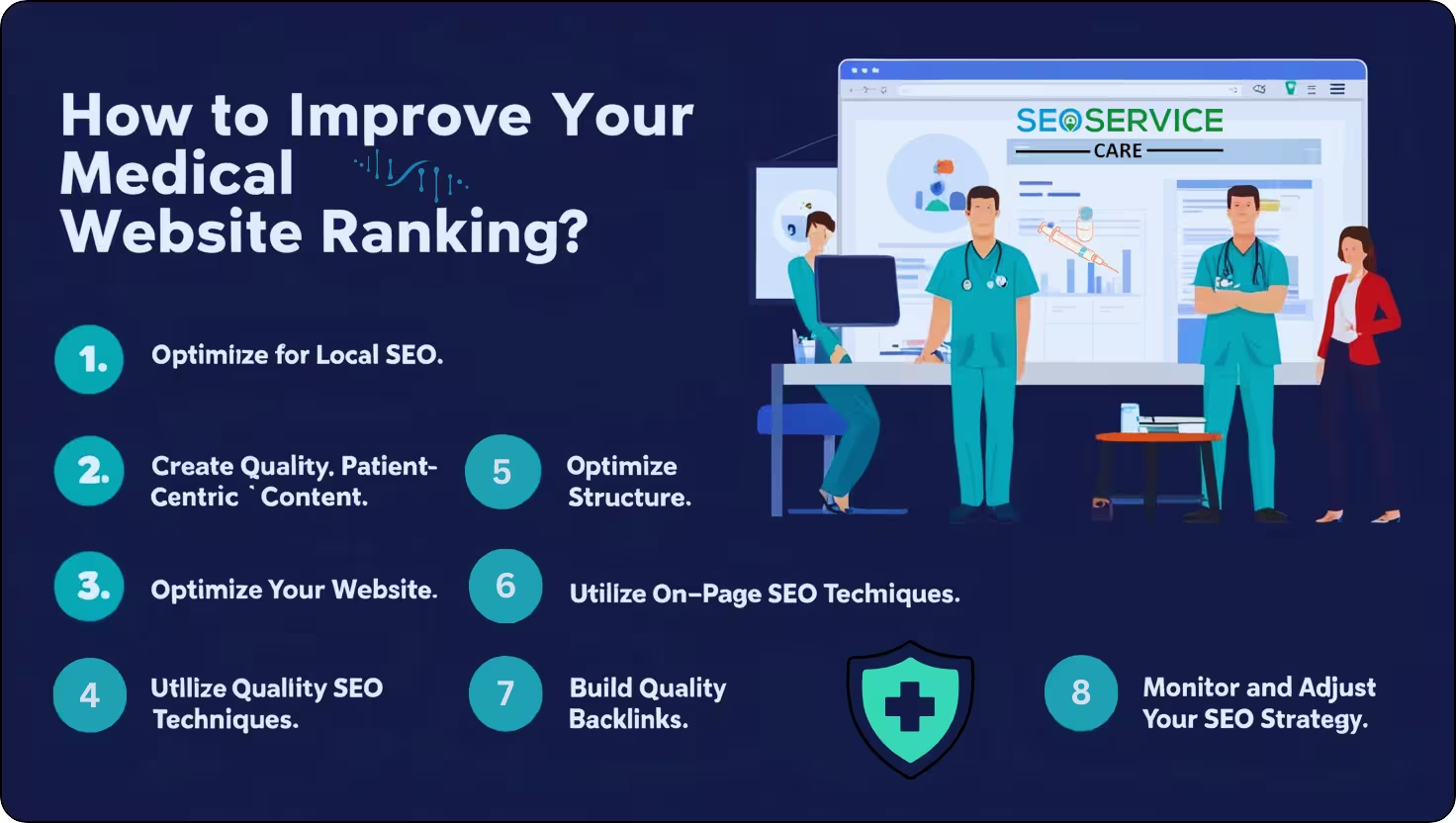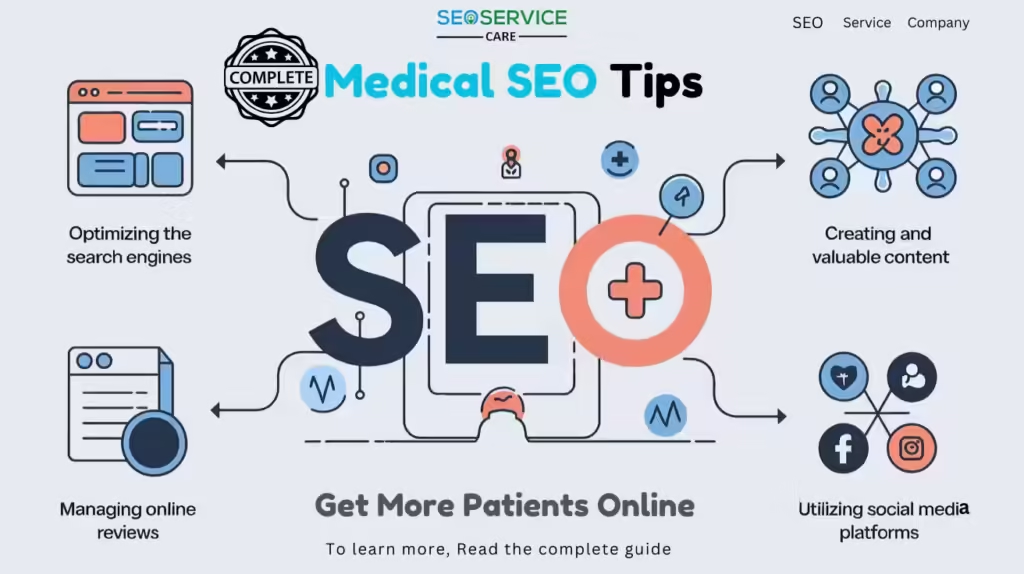If you are a doctor, clinic owner, or healthcare provider, you might have noticed something important: more and more people are looking online for health information. They have questions and want to find trusted doctors and clinics nearby. This is where Medical SEO comes into play!
But what is medical SEO, and why does it matter to you? Medical SEO helps make sure that when someone searches for health services or questions online, your website appears. It’s all about helping patients find the care they need. This can really help your practice grow!
In this guide, we will explain everything about medical SEO. We’ll cover how to choose the best SEO services and how to create content that meets Google’s rules for high-quality information. Let’s dive in and learn how to help more patients find you online!
What is SEO?
SEO refers to Search Engine Optimization. It is like polishing your image! The better you do SEO for your webpage, the more likely it is that it will appear on the first pages of Google, Bing, or any other search engine. This means that if people search for your services, your website will easily be discovered. Efficiently done SEO translates to increased traffic to the site.
Why Medical SEO is Different
Medical SEO has its own set of essential principles that must be observed. There are rules that govern confidentiality to ensure that the patient’s details are not exposed. There are also health content policies by Google. This is because they want to protect users from unreliable data that may hurt them especially when making health decisions.
So, while regular SEO helps people find your website, medical SEO ensures that the information is safe and correct for everyone’s health needs!
Medical SEO matters because:
- Patients are Searching Online: Nearly 77% of patients use search engines before they book an appointment.
- It Builds Trust: A high ranking on Google makes your practice look trustworthy and professional.
- It Helps You Stand Out: The healthcare field is competitive, so good SEO helps you reach more people.
How to Improve Your Medical Website Ranking

Let’s dive into some effective strategies you can use to improve your medical website ranking.
1. Optimize for Local SEO
Local SEO is crucial for medical websites because most patients want to find services nearby. Here are some tips:
Claim Your Google Business Profile
This free tool lets you manage how your practice appears on Google. To claim your profile, follow these steps:
- Go to Google My Business.
- Sign in or create an account.
- Enter your practice’s name, address, phone number, and hours of operation.
- Add photos of your office and staff.
Having a complete Google Business Profile makes it easier for patients to find you.
Use Local Keywords
Local keywords are phrases that include your location. For example, if you are a dentist in Los Angeles, you might use “dentist in Los Angeles” in your website content. Here are some ways to find local keywords:
- Think about what patients might search for. For instance, “family doctor in [Your City]” or “urgent care clinic near me.”
- Use keyword research tools like Google Keyword Planner to find popular local search terms.
Using local keywords in your content helps Google know where you are located and shows your website to people searching in your area.
Encourage Patient Reviews
Online reviews can help improve your local SEO. Patients trust the opinions of others. Here’s how to get more reviews:
- After an appointment, ask satisfied patients to leave a review on Google or other review sites like Yelp.
- Make it easy for them by providing links to your profiles.
Responding to reviews, both positive and negative, shows that you value patient feedback. these could help improve your online reputation.
2. Create Quality, Patient-Centric Content
Content is king when it comes to SEO. Providing valuable information can help improve your rankings. Here’s how to create content that attracts patients:
Focus on Common Patient Questions
Think about the questions your patients often ask. You can write blog posts or articles answering these questions. For example:
- “What should I expect during my first visit to a new doctor?”
- “How can I manage my diabetes effectively?”
By addressing common concerns, you make your website helpful. This can keep visitors on your site longer and encourage them to book an appointment.
Use Clear, Simple Language
Avoid using complicated medical terms. Write in a way that everyone can understand. Here are some tips:
- Use short sentences.
- Avoid jargon.
- Explain terms in simple language if you must use them.
For example, instead of saying “hypertension,” you can say “high blood pressure.” Simple language helps more people understand your content.
Include Expert Insights
Adding expert quotes or insights can boost your credibility. You can collaborate with other healthcare professionals or use trusted sources. For instance, if you are writing about nutrition, you could quote a registered dietitian. This shows that your content is reliable and backed by professionals.
3. Optimize Your Website Structure
A well-structured website makes it easy for both visitors and search engines to navigate. Here’s how to organize your website:
Mobile-Friendly Design
Make sure your website works well on mobile devices. More people are using smartphones to search for healthcare. A mobile-friendly site is essential. Here are some tips:
- Use a responsive design that adjusts to different screen sizes.
- Keep buttons and links easy to click on smaller screens.
You can test your website’s mobile-friendliness using Google’s Mobile-Friendly Test tool.
Fast Loading Speed
A slow website can drive visitors away. If your site takes too long to load, people will leave before it fully opens. Here’s how to speed up your site:
- Optimize images by reducing their size without losing quality.
- Minimize code and scripts to improve loading time.
Tools like Google PageSpeed Insights can help you check your website’s speed and give suggestions for improvement.
Clear Navigation
Make it easy for visitors to find information on your site. Use simple menus and clear headings. Consider the following:
- Organize content into logical categories.
- Use internal links to connect related pages, like linking your services page to your contact page.
A well-organized website helps visitors find what they need quickly, improving their experience.
4. Utilize On-Page SEO Techniques
On-page SEO involves optimizing individual pages to improve rankings. Here are some key techniques:
Title Tags and Meta Descriptions
Title tags are the main titles of your pages, and meta descriptions summarize the content. Both are important for SEO. Here’s how to optimize them:
- Include relevant keywords in your title tags. For example, “Best Pediatrician in [Your City].”
- Write clear and compelling meta descriptions to encourage clicks. Keep them around 150-160 characters long.
Good title tags and meta descriptions help search engines understand your content and attract more visitors.
Header Tags
Header tags (H1, H2, H3) help organize your content. Use them to create a clear structure. For example:
- Use H1 for the main title of the page.
- Use H2 for section titles.
- Use H3 for subsections.
Header tags improve readability and help search engines understand the hierarchy of your content.
Image Optimization
Images can enhance your website, but they should be optimized for SEO. Here’s how:
- Use descriptive file names. Instead of “IMG_1234.jpg,” use “pediatrician-consultation.jpg.”
- Include alt tags that describe the image. This helps search engines index the image and improves accessibility for visually impaired users.
Optimized images can improve loading speed and contribute to better rankings.
5. Build Quality Backlinks
Backlinks are links from other websites to yours. They are important for SEO because they signal that your content is trustworthy. Here are some ways to build backlinks:
Guest Blogging
Write articles for other reputable medical or health blogs. This can help you reach new audiences and earn backlinks to your site. When guest blogging:
- Choose blogs that are relevant to your practice.
- Write high-quality content that provides value to their readers.
Include a link back to your site in your author bio or within the content.
Collaborate with Local Organizations
Partner with local health organizations or charities. When you participate in community events, you may get mentions or links from their websites. This not only helps your SEO but also builds your reputation in the community.
Engage on Social Media
Share your content on social media platforms. Engaging posts can lead to shares and backlinks from other sites. Here are some tips:
- Post helpful health tips or articles from your blog.
- Interact with followers by answering questions or providing advice.
Social media can increase your visibility and drive traffic to your website.
6. Monitor and Adjust Your SEO Strategy
SEO is not a one-time task; it requires ongoing effort. Regularly monitoring your website’s performance is essential to see what works and what needs improvement. Here’s how to do it:
Use Analytics Tools
Google Analytics is a free tool that helps you track your website’s performance. You can see how many people visit your site, which pages they view, and where they come from. Pay attention to:
- Traffic Sources: Know where your visitors are coming from, like search engines or social media.
- User Behavior: See how long visitors stay on your site and which pages they visit most.
This data helps you understand what content is popular and what needs improvement.
Adjust Your Strategy as Needed
If certain keywords aren’t bringing in traffic, consider updating your content or trying new keywords. Stay informed about the latest SEO trends and adjust your approach accordingly. For example:
- If you notice more patients asking about telehealth services, consider creating content around that topic.
- Keep an eye on changes in Google’s algorithms and adjust your SEO strategies to comply with new rules.
How to Optimize Content with Medical SEO Keywords
Optimizing your content with medical SEO keywords helps more patients find your healthcare website. Here’s how to do it in a simple way.
1. Know Your Audience
First, think about who you want to reach. Ask yourself:
- Who are my patients?
- What health problems do they want to learn about?
- What questions do they often ask?
Knowing your audience helps you choose the right keywords.
2. Do Keyword Research
Keyword research means finding out what words people use when they search online. Here’s how to do it:
- Use Keyword Tools: You can use tools like Google Keyword Planner to find popular keywords. Type in words like “doctor” or “clinic” to see what people search for.
- Think of Long-Tail Keywords: Long-tail keywords are longer phrases that are more specific. For example, instead of just “doctor,” you might use “best family doctor in [Your City].” These are easier to rank for.
- Check What Others Are Using: Look at other medical websites. See what keywords they are using. This can give you ideas for your own keywords.
3. Pick Primary and Secondary Keywords
Once you have some keywords, choose one primary keyword and a few secondary keywords for each piece of content:
- Primary Keyword: This is the main keyword for your content. For example, if you’re writing about allergies, your primary keyword could be “allergy treatment.”
- Secondary Keywords: These are related keywords. For example, “allergy symptoms” and “how to prevent allergies” can be secondary keywords.
4. Write Great Content
Now it’s time to create content. Here are some tips:
- Use Keywords Naturally: Put your primary and secondary keywords in your writing. But don’t overuse them. Just use them where they fit. Aim for 1-2% keyword density, which means for every 100 words, use the keyword once or twice.
- Make It Easy to Read: Write clearly and answer questions your audience has. Use simple words. For example, if you talk about allergies, explain how they happen in easy terms.
- Organize Your Content: Use headings and subheadings to break up the text. This helps people read and understand better. For example:
- H1: Allergy Treatment
- H2: What Are Allergies?
- H2: Symptoms of Allergies
- H3: How to Manage Allergies
5. Optimize Your Website
Make sure your website helps with SEO. Here’s what to do:
- Title Tags: Use your primary keyword in the title tag of your page. For example, “Allergy Treatment: How to Feel Better.”
- Meta Descriptions: Write a short summary of your content that includes the primary keyword. Keep it under 160 characters. For example, “Find the best allergy treatment options and tips for managing symptoms.”
- Header Tags: Use header tags to organize your content. Use H1 for the main title and H2 for section titles.
- Image Optimization: Use pictures to make your content better. Name the images with descriptive names like “allergy-medication.jpg” and add alt text that describes the image.
6. Link to Other Content
Linking is important for SEO. Here’s how to do it:
- Internal Links: Link to other pages on your website. For example, if you mention allergy symptoms, link to a page that explains them.
- External Links: Link to trustworthy websites for more information. For example, link to a well-known health organization’s site for data on allergies.
7. Update Your Content Regularly
Keep your content fresh and up-to-date. Here’s how:
- Review Your Content: Check your articles often. Update any information that’s old or incorrect.
- Add New Content: Write about new topics or trends in healthcare. This keeps your site interesting and helps you attract more visitors.
8. Check How You’re Doing
Finally, see how well your content is performing. You can use tools like Google Analytics to check:
- Traffic Sources: Where are your visitors coming from? Which keywords are bringing them to your site?
- User Engagement: Are visitors staying on your site? Are they reading more pages? If not, you might need to improve your content.
- Keyword Rankings: See how your keywords are doing over time. Adjust your keywords and content based on what you find.
Why You Need Local SEO for Healthcare
Local SEO helps your practice show up in local searches. For example, if someone types “pediatrician near me,” you want your practice to be in the results if you are nearby. Local SEO is very important for healthcare providers. Most patients want to find services close to where they live.
Steps to Improve Local SEO for Healthcare
- Claim Your Google Business Profile
Your Google Business Profile (formerly Google My Business) is a free tool. It helps you manage how your practice looks on Google. Add your practice’s name, address, phone number, and hours. Make sure this information is correct. - Add Location-Based Keywords
Use keywords that include your location in your content. For example, use phrases like “cardiologist in [Your City]” or “dentist near [Your Neighborhood].” This helps people nearby find you when they search. - Encourage Patient Reviews
Ask happy patients to leave reviews on Google. Good reviews help your local SEO and make your practice look trustworthy. The more positive reviews you have, the better! - List Your Practice in Online Directories
Register your practice in online health directories like Healthgrades, Zocdoc, and Yelp. These sites usually rank high in search results. This means they can bring more people to your practice.
Local SEO can significantly boost your visibility to nearby patients. With the help of local SEO white label medical SEO services, you can even have experts manage this for you.
What Are the Benefits of Medical SEO and What Mistakes Should You Avoid?
Medical SEO is important for your healthcare website. It helps patients find you when they need care. Let’s look at the great things about medical SEO and some mistakes you should avoid.
Benefits of Medical SEO
- More Patients Can Find You With Medical SEO, your website shows up higher in search results. It means more people will see your site. For example, if someone types “pediatrician near me,” you want to be one of the first names they see. The higher you rank, the more visitors you get!
- Builds Trust and Credibility When your website ranks high, people trust it more. They see you as an expert and This trust is very important in healthcare. When patients trust you, they are more likely to choose you as their doctor.
- Improves the Quality of Your Website SEO encourages you to create valuable content. When you write helpful articles or guides, patients get the information they need. For example, you could provide tips on managing diabetes or information on common allergies. This makes your site a go-to resource for health info.
- Increases Website Traffic More visitors mean more potential patients. When your website gets a lot of traffic, it boosts your chances of turning those visitors into actual patients. A well-optimized site can lead to more appointments and more success for your practice.
- Helps You Stand Out from Competitors The healthcare field is competitive. Good SEO helps you stand out. you can attract more patients than others in your area by using the right keywords and creating useful content.
Common Mistakes to Avoid in Medical SEO
- Ignoring Keyword Research
Keyword research is finding out what words people use to search for healthcare. Some providers skip this step. This can lead to using the wrong words, making it hard for patients to find you. Always research keywords that fit your services. - Using Too Many Keywords
While it’s important to use keywords, using too many can hurt your site’s ranking. This is called keyword stuffing. It makes your content awkward and hard to read. Instead, use keywords naturally within your writing. - Not Updating Content Regularly
Medical information changes all the time. If you don’t update your content, it can become outdated. Outdated information can confuse patients. Regularly check and refresh your articles to keep them accurate and relevant. - Neglecting Mobile Users
Many patients search for medical information on their phones or tablets. If your website isn’t easy to use on mobile devices, you could lose visitors. Make sure your site looks good and works well on all screens. - Not Using Local SEO
Local SEO helps people find your practice in their area. If you don’t use it, you might miss local patients. Include your city or neighborhood in your keywords and website content to attract more local visitors. - Forgetting About User Experience
Your website should be easy to navigate. If visitors can’t find what they’re looking for, they will leave. Make sure your site is user-friendly with clear menus and a simple layout. This keeps visitors on your site longer. - Ignoring Analytics
Analytics show you how your website is performing. Some providers forget to check these tools. Without this information, you won’t know what’s working and what isn’t. Regularly review your analytics to improve your SEO strategy.
How to Choose the Best Medical SEO Services
Finding a good SEO provider is important for your healthcare business. Here are some tips to help you choose the right one.
1. Look for Experience in Healthcare SEO
Not all SEO providers are the same. Medical SEO is different from regular SEO. You want to find an agency that has worked with healthcare providers before. They understand the essential needs of your industry, like keeping patient information safe.
2. Check for Transparency and Communication
A good SEO agency will tell you what they are doing. They should explain their process clearly. Ask them how often they will send you updates. You should know when they will share reports or meet with you to discuss how things are going.
3. Make Sure They Follow Medical Standards
SEO for healthcare must be careful. Ask the agency how they make sure their content follows the rules. They have to know about Google’s standards for health information.
4. Ask for Proven Results
You want to see proof that the agency can help you. Ask them to see their successful SEO campaigns. Look for reviews or stories from other healthcare practices they have helped. It will show you what they know and what they are doing.
Tracking Your Medical SEO Campaign
Once your SEO strategy is in place, it’s important to track how well it’s working. A medical SEO campaign includes regular monitoring and adjustments to keep improving your website’s performance.
Key Metrics to Track
- Keyword Rankings: Track how your website ranks for important keywords like “medical SEO expert” or “medical SEO near me.” This shows if your content is reaching the right audience.
- Website Traffic: Tools like Google Analytics show how many people visit your website, where they’re coming from, and which pages they view.
- Conversion Rates: A conversion happens when a visitor takes an action, like booking an appointment or filling out a contact form. Monitoring conversions helps you see if your SEO is bringing in new patients.
- Patient Engagement: Track how long visitors stay on your site and which pages they visit. Engaging content keeps people on your site longer, which can improve your search rankings.
Your medical SEO consultant or specialist should provide regular reports with these metrics and help you make adjustments to improve your results.
Conclusion: Why Medical SEO is Worth the Investment
Medical SEO is a powerful way to connect with patients, build trust, and grow your practice. you can choose the right SEO agency by focusing on local SEO. By creating valuable content, you can make it easier for people to find your healthcare services online.
Contact us today to learn more about our medical SEO services if you’re ready to take the next step in growing your practice. With the right strategy and expert support, you can make sure more patients find and trust your practice.
Frequently Ask Questions (FAQs) about Medical SEO
Q: How does social media help my medical practice?
A: Social media can assist you in interacting with your patients and disseminating the necessary information. It can also increase traffic to your site.
Q: How often should I update my website content?
A: It is recommended that you update your content at least quarterly. New updates or even old articles are all contributing factors to an active and lively site.
Q: What is schema markup, and why is it helpful?
A: Schema markup helps search engines understand your website better. It can make your listing more attractive, showing ratings or hours, which can help more people click on it.
Q: How can I encourage more patient reviews?
A: Ask happy patients to leave reviews after their visits. Or introduce a follow-up message that includes a review link.
Q: Should I use a blog for my medical practice?
A: Definitely! A blog can provide useful health information regarding frequently asked questions. This could encourage the visitors more as well as provide the concern of teaching the patients.
Q: What type of content should I create to attract more patients?
A: Write articles, create an FAQ, and add reviews and descriptions of services. Target patients’ FAQs which are commonly raised and also their associated health issues as per their demographics.






